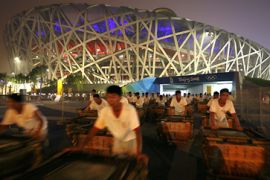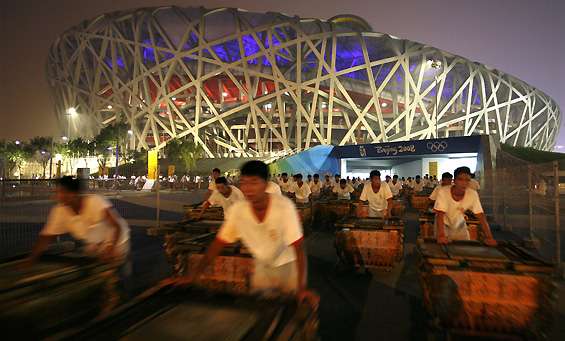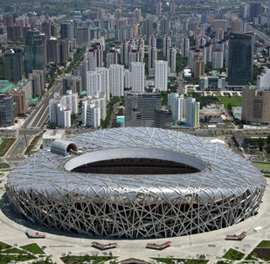‘The biggest games ever’
After all the hype and preparations, what do the Olympics really mean to China?

 |
| Seven years of preparations are finally drawing to an end [Reuters] |
It will, China has promised, be the biggest Olympic games ever held.
After seven years of preparations, the venues are ready, new subway lines have opened, polluting factories have been shut down, the medals girls have perfected their “eight-tooth” smile, and locals are being schooled in the “Olympic Four-Step” – a nifty set of moves designed to pump up the home team.
It is costing an estimated $42 billion – some $40 billion on revamping the city with $2 billion on the games themselves – to welcome 205 participating countries. That is four more countries than Athens got in 2004.
 |
| Medal girls have been carefully trained in the perfect Olympic smile [Reuters] |
It is an expensive party – so what does China hope to get out of it all?
Richard Baum, the director of the Centre for Chinese Studies at the University of California, Los Angeles says the Olympics are seen as the showcase for China’s economic miracle.
“It’s clearly a moment for Beijing to grab the spotlight of international publicity at a time when its economy has been growing spectacularly for 30 years,” he says.
“It is, as everyone says, a golden coming out.”
For the government, the games are also the fulfilment of a 100-year-old dream, says Susan Brownell, an anthropologist from the University of Missouri, St Louis, and who is conducting research at Beijing Sports University.
| Beijing voices | ||
The Olympics and me: Eight Beijingers on what the games means to them. |
“The first call in print for China to host the games came around 1908,” she explains. “It was a YMCA campaign to stir up patriotism.”
“From the very beginning, the idea of hosting the Olympic games was associated with having a strong and prosperous nation that would be treated as an equal by other nations,” says Brownell, whose book, Beijing’s Games: What the Olympics Mean to China, was published earlier this year.
World citizens
But a lot of the government’s attention, she adds, has been focused domestically rather than in grooming its international image.
 |
| Beijing has spent billions of dollars sprucing itself up for the games [AFP] |
“Its practical goal is to use the Olympic games to internationalise China and create a generation of Chinese people that are equipped to be world citizens,” she says.
As well as exhorting Beijingers to be more “foreigner friendly” by offering English lessons and launching drives to stamp out spitting and queue jumping, last year the government launched a massive Olympics education programme across the nation’s schools.
New Olympics lessons have been added to the curriculum, teaching pupils about the history of the games and China’s gold medal hopefuls.
Michael Davis, a professor at the Chinese University of Hong Kong, says what is most interesting about the Beijing Olympics is the level of nationalism that has been attached to it.
It is not Beijing’s games, he says, it is China’s.
“It’s not always the case that when the Olympics are hosted that they take on such a strong nationalistic image,” he says.
“And I think the Chinese people agree with this. There is a kind of history – in Chinese popular perception – of humiliation over the last couple of decades.”
The Olympics, Davis says, provide “a sense of restoration of what Chinese people may view as their rightful place in the world”.
Pride
 |
| Olympic fever has gripped the city as the countdown nears an end [AFP] |
Asked to speak on the record, locals on the streets of Beijing almost universally express pride that China is hosting the games and what an opportunity it is to show the world how far the country has come economically.
“It’s a sign that our country has become richer and stronger and that we are now part of the international community,” says a 61-year-old rickshaw driver, who would only give his surname Li.
“I am very proud of my country because we are proving that we can hold such a big international event like the Olympics.”
Li is not alone.
“Chinese people have a pride of association with the achievement of modernisation and development,” says Baum.
|
IN DEPTH |
|
|
“This is probably the first time in a century that they can take real legitimate pride in something that is Chinese, uniquely Chinese … It’s been a long time coming.”
And, he adds, it is not just mainland Chinese – it is ethnic Chinese across the board that are demonstrating great pride for this year’s games.
Many of the Chinese who meted out rough treatment to pro-Tibetan protesters during the international leg of the Olympic torch relay earlier this year were from the Chinese diaspora and not the People’s Republic, he says.
But while the sense of pride among many Chinese is obvious, in Beijing there is also an undercurrent of resentment from those who have felt the rough side of China’s quest for Olympic glory.
‘Rich persons’ games’
“They are a rich persons’ games, not ours,” said one woman whose home was among many to be demolished by the local government to make way for Olympic development.
Of the thousands forced to move – either to make way for games venues or simply because their homes were considered unsightly – there has been widespread claims of forced evictions, intimidation, and little or no compensation.
 |
| Olympic volunteers catch a chance to get some rest before the games [AFP] |
Adding to the disconnect and disillusionment have been the new security measures and traffic rules the government has rolled out for the games.
Non-Beijingers have found it much harder to get temporary residence permits, passengers on the subway are being forced to go through security checks, and to limit car exhaust pollution restrictions have been imposed on who can drive in the city.
Talking off the record locals say they are put out by the new rules – they feel the games offer no direct benefit, and they are worried that China cannot afford them.
One taxi driver says the games mean nothing to him and that all the new rules are nothing more than an annoyance.
“Why should I learn a foreign language? I don’t have time for that,” he complains, referring to campaigns to get cabbies to study English.
There is none of this kind of debate in public though. There is such a nationalistic fervour behind the games that it is seen as unpatriotic to query the Olympics.
“China has effectively mobilised a kind of popular outrage, a nationalistic response,” to anyone who criticises the games, says Michael Davis of the Chinese University of Hong Kong.
In a small café on a Beijing backstreet, the young owner privately complains about all the new security rules, doubting whether China is ready to host the games.
“The police call us for neighbourhood meetings every few days now,” she says.
“They ask us if we’ve seen any illegal behaviour like gambling and so on. There are all these new rules on what we can and can’t do. They are rushing through all these new measures. I know it’s for our security, but it’s all at the last minute. I am worried that we are just not ready.”
She does not have long to find out. After seven years of preparation – China’s Olympic day of reckoning has finally arrived.

